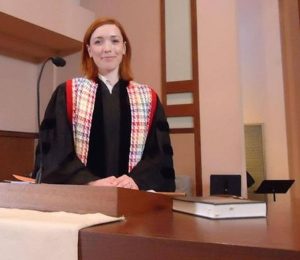Plaintiffs in the lawsuit against mandatory Ten Commandments displays in Louisiana public classrooms have asked a federal court to bar implementation of the new law as their litigation proceeds.
Signed into law June 19, House Bill 71 requires the posting of framed or poster copies of the Decalogue in every state-funded grade school and college classroom no later than Jan. 1, 2025.
The plaintiffs’ July 8 motion for preliminary injunction in Roake v. Brumley asks the U.S. District Court for the Middle District of Louisiana also to prevent the displays from going up prior to next year’s deadline.

Darcy Roake
“We are eager to ensure that our family’s religious-freedom rights are protected from day one of the upcoming school year,” said co-plaintiff Darcy Roake, a Unitarian Universalist minister and parent of two children.
“The Ten Commandments displays required under state law will create an unwelcoming and oppressive school environment for children, like ours, who don’t believe in the state’s official version of Scripture,” she said. “We believe that no child should feel excluded in public school because of their family’s faith tradition, and we are optimistic that the court will grant our motion for a preliminary injunction.”
Attorneys for the plaintiffs have requested a hearing on the motion during the week of July 29 and hope for a ruling before school starts Aug. 8, according to Americans United for Separation of Church and State.
AU, the American Civil Liberties Union, ACLU of Louisiana, the Freedom from Religion Foundation and the Simpson Thacher and Bartlett law firm are representing the nine Christian, Jewish and nonreligious families in the action. The complaint filed June 24 alleges Louisiana’s law, which also mandates use of a Protestant version of the Ten Commandments, violates plaintiffs’ rights under the U.S. Constitution’s Establishment and Free Exercise clauses.
“This lawsuit is necessary to protect the religious freedom of Louisiana public school children and their families,” AU President Rachel Laser said when the suit was filed June 24.
“Not just in Louisiana, but all across the country, Christian nationalists are seeking to infiltrate our public schools and force everyone to live by their beliefs. Secular, inclusive public schools that welcome all students regardless of their belief system form the backbone of our diverse and religiously pluralistic communities,” she said. “This nation must recommit to our foundational principle of church-state separation before it’s too late. Public education, religious freedom and democracy are all on the line.”
“This lawsuit is necessary to protect the religious freedom of Louisiana public school children and their families.”
Louisiana’s translation and its specific redacting of the commandments is especially troublesome, Freedom from Religion attorney and legal fellow Sammi Lawrence said during a recent edition of the organization’s “Ask an Atheist” webinar.
“This is problematic for a wide variety of reasons, including that the government is choosing a specific interpretation and translation of the Ten Commandments. I’m sure our audience knows, and probably Christians and religious people in the U.S. know that the Ten Commandments vary from sect to sect, religion to religion. There are many different interpretations and translations of them.”
This is why Louisiana’s mandated version of the scriptural passage is not numbered and actually presents 12 commandment lines, FFRF Legal Director Patrick Elliott added. “Even Christians are surprised that these are excerpts from the Bible and from, in this instance, one specific translation of the Bible which seems to exclude not just Jews and other individuals that wouldn’t use that translation, but even some Christians.”
Separately, the Christian social action group Faithful America issued a petition and statement July 9 condemning Oklahoma’s new requirement that the Bible be physically present and taught in all public school classrooms. The call to action included a warning about Louisiana’s Ten Commandments law.
“Forcing Christianity on others is theocracy — and coercion is the opposite of Christ-like love. Let’s speak out publicly together to make it clear … that Christians support religious freedom for all,” the organization said.
Related articles:
Jesus and the Ten Commandments | Opinion by Chuck Poole
That Ten Commandments law isn’t the worst thing about Louisiana’s ‘Dream Big’ act for public education | Analysis by Mara Richards Bim
The Ten Commandments meet the Golden Rule | Opinion by Greg Hunt
Why is this still happening? | Opinion by Holly Hollman


